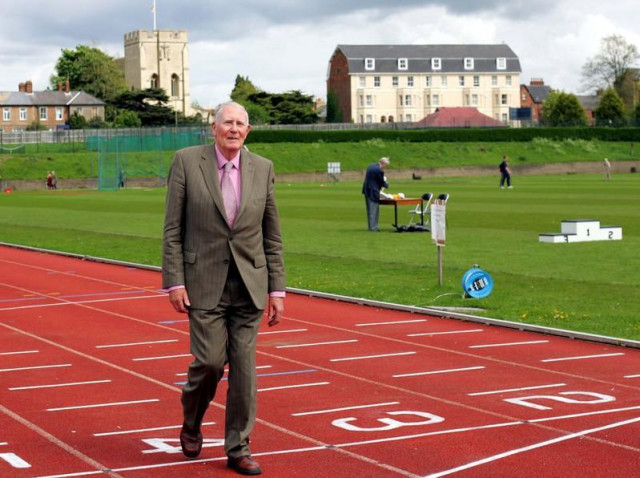British athletics great Roger Bannister dies aged 88
Bannister's black-leather pair of shoes were sold for £266,500 in September 2015

Sir Roger Bannister walks over the same finish line at the Iffley Road running track in Oxford that he crossed fifty years ago when he was the first man to run the sub four minute mile. PHOTO: REUTERS
"Sir Roger Bannister, died peacefully in Oxford on 3rd March 2018, aged 88, surrounded by his family who were as loved by him, as he was loved by them," his family said.
"He banked his treasure in the hearts of his friends," they added, in a statement published by the Press Association news agency.
Good for health: ‘Sports to boost morale of police force’
Bannister gained global sporting glory on May 6, 1954, when he ran a mile (1.6 kilometres) in three minutes 59.4 seconds at the Iffley Road track in Oxford.
Seb Coe, president of the International Association of Athletics Federations, said Bannister's death marked "a day of intense sadness both for our nation and for all of us in athletics".
"There is not a single athlete of my generation who was not inspired by Roger and his achievements both on and off the track," tweeted Coe, who won two Olympic gold medals in the 1980s.
Half a century later after Bannister's record, the Royal Mint celebrated the occasion by issuing a 50 pence coin showing an athlete's running legs against a stopwatch.
British Prime Minister Theresa May described Bannister as "a great British sporting icon whose achievements were an inspiration to us all".
"He will be greatly missed," she wrote on Twitter.
Despite being famed for breaking the four-minute barrier, Bannister said he felt a greater sense of achievement winning gold at the 1954 Commonwealth Games in Vancouver, beating his great rival Australian John Landy in a race later dubbed the "Miracle Mile".
"I think that racing in the Olympics and Commonwealths is more important than breaking records," Bannister said in 2014.
"Vancouver was the pinnacle of my athletics career. It is very difficult to break records during Olympic competition, but winning races was better than holding world records."
The current one-mile record has since 1999 been held by Morocco's Hicham El Guerrouj with a time of 3:43.13 secs.
But Bannister's achievement has continued to inspire athletics enthusiasts, with the shoes he wore to break the four-minute barrier selling for a record.
The black-leather pair of shoes sold for £266,500 in September 2015 -about $409,000 at the exchange rate at the time.
By then Bannister was having trouble walking, let alone running, after revealing he was suffering from Parkinson's disease.
Anyone 'disrespecting' Iranian athletes must apologise, Iran tells Olympic Committee
The condition progressively damages part of the brain over time and is one Bannister was familiar with, even before he was first diagnosed a few years ago, from his lengthy career as neurologist.
"I am being well looked after and I don't intend to let it interfere - as much as I can," he told the BBC in 2014.
"Just consider the alternatives - that is the way I look at it," he added. "Intellectually I am not (degenerating) and what is walking anyway!"





1725099588-0/BeFunky-(41)1725099588-0-208x130.webp)













COMMENTS
Comments are moderated and generally will be posted if they are on-topic and not abusive.
For more information, please see our Comments FAQ